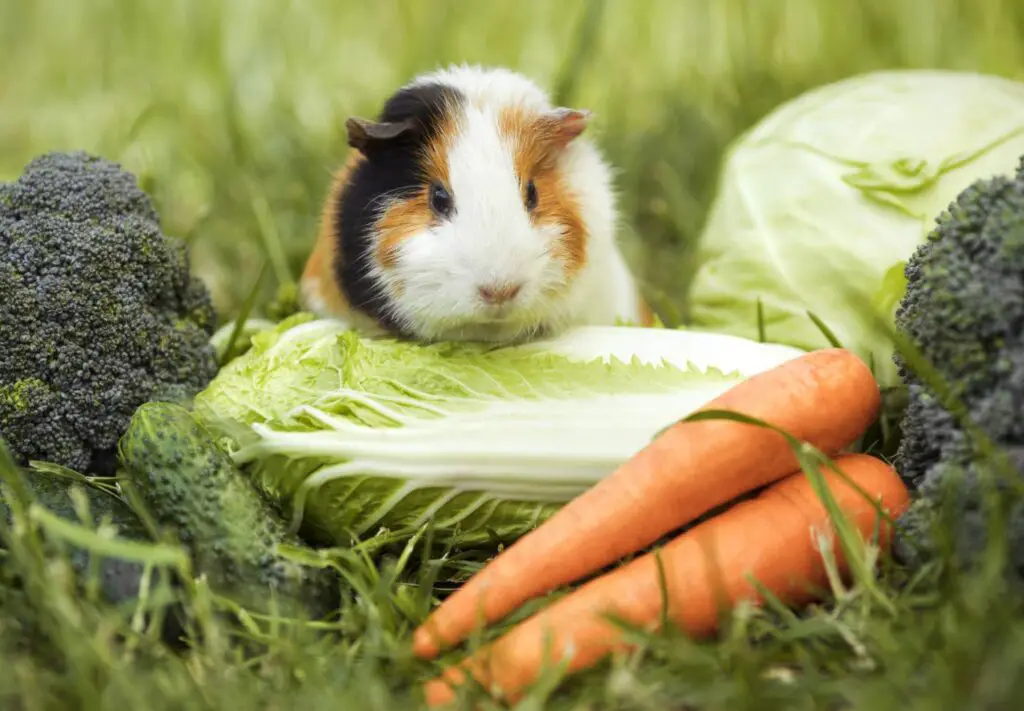Guinea pigs are herbivorous animals that require a balanced diet to maintain their health and well-being. This means that their diet should consist of hay, fresh vegetables, small amounts of fruit, and pellets made specifically for guinea pigs.
However, not all vegetables are suitable for guinea pigs, and it’s important to know which ones are safe for them to eat. In this blog post, we will discuss whether guinea pigs can eat cabbage, the health benefits and potential risks of feeding cabbage to guinea pigs, and how to safely feed cabbage to them.
Luckily, guinea pigs can indeed at cabbage, but there are a few things you need to know before feeding

Health Benefits of Cabbage for Guinea Pigs
Nutritional Value of Cabbage
Cabbage is a cruciferous vegetable that is low in calories but high in nutrients. It contains vitamins C, K, and B6, as well as folate, manganese, and potassium.
These nutrients are essential for the health of guinea pigs, and incorporating cabbage into their diet can provide many health benefits.
Antioxidant Properties of Cabbage
Cabbage is also rich in antioxidants, which help to protect the body from damage caused by free radicals. Free radicals can cause oxidative stress, which can lead to cell damage and contribute to the development of chronic diseases.
By incorporating cabbage into their diet, guinea pigs can benefit from its antioxidant properties and help to protect their bodies from damage.
Cabbage as a Source of Vitamin C
Guinea pigs require vitamin C in their diet, as they are unable to produce it themselves. Without enough vitamin C, they can develop scurvy, which can cause symptoms such as lethargy, loss of appetite, and swollen joints.
Cabbage is a good source of vitamin C, and incorporating it into their diet can help to prevent a vitamin C deficiency.
Potential Risks of Feeding Cabbage to Guinea Pigs
Gas and Digestive Issues
Cabbage is a vegetable that can cause gas and digestive issues in some guinea pigs. This is because it contains a compound called raffinose, which can be difficult for some animals to digest.
If your guinea pig experiences gas or digestive issues after eating cabbage, it’s best to avoid feeding it to them in the future.
Oxalate Content
Cabbage also contains oxalates, which can contribute to the formation of kidney stones in some guinea pigs.
While small amounts of cabbage are unlikely to cause any issues, it’s best to avoid feeding large amounts of it to your guinea pig.
Calcium to Phosphorus Ratio
Cabbage also has a high calcium to phosphorus ratio, which can disrupt the balance of these minerals in a guinea pig’s diet.
This can lead to issues such as urinary tract problems and bladder stones. It’s important to ensure that your guinea pig’s diet is balanced and includes a variety of vegetables to prevent any mineral imbalances.
How to Safely Feed Cabbage to Guinea Pigs
Feeding Frequency
Cabbage should be fed to guinea pigs in moderation and as part of a balanced diet. It’s best to introduce new vegetables slowly and in small amounts to avoid any digestive issues.
Cabbage can be fed to guinea pigs once or twice a week, in small portions.
Preparation of Cabbage
When feeding cabbage to guinea pigs, it’s important to prepare it properly. Remove any tough stems and wash the leaves thoroughly before feeding them to your guinea pig.
It’s best to feed cabbage raw, as cooking can destroy some of its nutrients.
Portion Control
To prevent any digestive issues or mineral imbalances, it’s important to control the portion size of cabbage. A small piece of cabbage or a few leaves are enough for a guinea pig’s portion size.
Other Vegetables Suitable for Guinea Pigs
Green Leafy Vegetables
Green leafy vegetables such as kale, spinach, and romaine lettuce are excellent sources of vitamins and minerals for guinea pigs. They should be fed in moderation, as they can also cause digestive issues if fed in large quantities.
Root Vegetables
Root vegetables such as carrots, sweet potatoes, and parsnips are also suitable for guinea pigs. They are a good source of vitamins and minerals and can be fed in small amounts as part of a balanced diet.
Other Cruciferous Vegetables
Other cruciferous vegetables such as broccoli and cauliflower are also suitable for guinea pigs. They should be fed in moderation, as they can also cause gas and digestive issues in some animals.
Conclusion
In conclusion, guinea pigs can eat cabbage but should be fed in moderation and as part of a balanced diet. While cabbage has many health benefits for guinea pigs, it also has potential risks if fed in large amounts.
It’s important to ensure that your guinea pig’s diet includes a variety of vegetables to provide them with a balanced and nutritious diet. By following these guidelines, you can safely incorporate cabbage and other vegetables into your guinea pig’s diet and help to keep them healthy and happy.
- How Long Do American Eskimo Dogs Live? Important Factors and Care Tips - September 29, 2023
- Do American Bulldogs Need Grooming? Essential Tips and Care Guidelines - September 29, 2023
- Do Bengal Cats Enjoy Playing? Essential Tips for Keeping Them Active - September 29, 2023